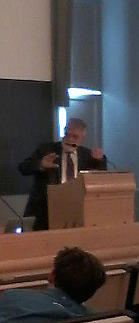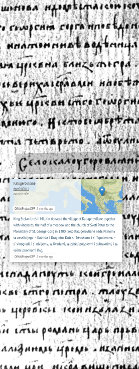|
|
|
|
|
|
|
|

|
Digitising Patterns of Power
Newsletter No.2 / June 2017
|
Dear Ladies and Gentlemen,
Dear Colleagues,
The summer of 2017 has arrived, and we are really looking forward to our participation at the
International Medieval Congress (IMC) 2017 in Leeds (United Kingdom). It will be, as always, the suitable
and important venue for us to present our newest scholarly results and digital tools, which will be open
to questions, discussion and remarks.
Moreover, our technical cooperation with Pelagios has evolved and, therefore, our colleague Rainer Simon
(Austrian Institute of Technology / AIT) will join us with a paper on Recogito in the first of our two
sessions in Leeds.
The DPP Lecture Series is regularly taking place in Vienna and attracting audience from different
academic fields. It is our special endeavour to address students and young scholars from University
by presenting and discussing emerging methods in the Humanities and Digital Humanities. Moreover, we
will publish our most recent scholarly results in the peer reviewed journals
Medieval Worlds and Acta Archaeologica Carpathica very soon.
We hope to meet you in Leeds and wish you nice and pleasant summer holidays!
Yours sincerely,
the DPP team
|
|
|
|
|
|
|
|
Congress on Historical Geography
in Uppsala
|

|
Uppsala University (here Dr Myrto Veikou)
organised an International Conference entitled
"From the Human Body to the Universe: Spatialities of Byzantine Culture" from 18 May until 21 May 2017 in Uppsala, Sweden.
Many cultural aspects speak for the crucial importance of spatialities for the Byzantines.
Their bodies and minds are performed as their most personal spaces of social identity and control.
In that way they construct their own culturally appropriated spaces, producing Byzantine landscapes.
These landscapes are dominated by power relations, which divide them into territories, and performed by cultural practices.
|

|
|
|
Experts of the project DPP and of the Long-Term-Project
Tabula Imperii Byzantini (TIB) of the Austrian Academy of Sciences in Vienna were kindly invited
by the organisers to present their scholarly work and expertise on various aspects of the Historical Geography
of the Mediterranean World. Johannes Koder (TIB) delivered a remarkable keynote lecture on "Space
and Identity – Byzantine Conceptions of Geographic Belonging". Andreas Külzer (TIB) presented
his manifold scholarly work on Asia Minor (TIB 14
and TIB 17)
in his paper "Ephesus and its Hinterland: Reconstructing the Past in a Changing Landscape", while
Peter Soustal (TIB) spoke on "Haliakmon – Bistrica – İnce Kara Su. The Main River of Southwestern
Macedonia and its Surrounding Country". Finally, Mihailo Popović (TIB and DPP) presented in his
paper "Landscapes, Settlements and Historical Geography – a Case Study on Byzantine Macedonia" scholarly
results deriving from his
case study within DPP and from his TIB-volume 16.
All participants had the opportunity to engage in fruitful discussions, which will certainly enrich their future studies.
|
|
|
|
|
|
|
|
"Best Practice" based on Recogito
|

|
As has been announced in our last DPP Newsletter in April, David Schmid and Mihailo Popović have annotated
the scans of the Slavonic charter given to the Monastery of Saint George-Gorg near Skopje by the Serbian
king Milutin in the year 1300 (Ohio State University, Hilandar Research Library (HRL),
SPEC.HM.SDS.132 and 133) based on the software Recogito.
Altogether 32 places in a base map provided by Pelagios
were linked to the respective toponyms in the scans of the charter.
Please cf. the following link to browse the first results of this confined case study:
http://recogito.pelagios.org/OEAWProjectDPP
These determined steps have created a "best practice" in this area of research for the project DPP and will
be embedded in the DPP OpenAtlas Database as well as in the Map-Based DPP Application in the course of 2017.
|
|
|
|
|
|
|
|

|
DPP Lectures 2 & 3
|
In the spring of 2017 two lectures within the
DPP Lecture Series took place in Vienna. Priv.-Doz. Dr. habil. Rainer Schreg (Römisch-Germanisches
Zentralmuseum – RGZM, Leibniz-Forschungsinstitut für Archäologie, Mainz) spoke on the topic "Die
justinianische Stadtgründung Caričin Grad / Iustiniana Prima – eine 'öko-archäologische' Perspektive"
on 24 May 2017. This 2nd DPP Lecture was organised by DPP in cooperation with the Long-Term-Project
Tabula Imperii Byzantini (TIB) and with
the Austrian Archeological Institute (OeAI),
here with the Director of the OeAI
Mrs. Priv.-Doz. Mag. Dr. Sabine Ladstätter.
The 3rd DPP Lecture took place on 8 June 2017. Ass. Prof. Dr. Toni Filiposki ("Ss. Cyril and Methodius"
University, Department of History, Skopje) presented his paper entitled "Vlachs from Macedonia in the
Medieval Written Sources: Ethnicity and / or Social Category", followed by Prof. Dr. Boban Petrovski
("Ss. Cyril and Methodius" University, Department of History, Skopje) with a paper on "The Vlachs between
Settlements and Mountains in Medieval Polog". Both professors had come to Vienna based on a joint scholarly
project entitled
"The Ethnonym of the Vlachs in the Written Sources and the Toponymy in the Historical Region of Macedonia
(11th-16th Cent.)", which was successfully submitted by the project coordinators Mihailo
Popović and Toni Filiposki and is funded by the Centre for International Cooperation & Mobility
(ICM) of the Austrian Agency for International Cooperation in Education and Research (OeAD-GmbH).
|
|
|
|
|
|
|
|
DPP at the IMC Leeds 2017, 3-6 July 2017
|

|
Since the beginning of the Project "Digitising Patterns of Power (DPP)" in January 2015 the team has been
participating each year at the International Medieval Congress (IMC) at the University of Leeds.
This year Veronika Polloczek, Bernhard Koschicek, Markus Breier, David Schmid, Mihailo Popović,
Stefan Eichert and Alexander Watzinger are looking forward to take part in the IMC 2017 (together with
Rainer Simon, a special cooperation partner of the Austrian Institute of Technology) and to present the
following papers related to DPP:
Session 239: Digitising Patterns of Power, I: Genealogy on a Map
- Veronika Polloczek, Memoria and Self-Representation on the Example of Hans III Herzheimer
- Bernhard Koschicek, How to Digitise Genealogical Data with the OpenAtlas Software?: The Example of the Herzheimer Chronicle
- Markus Breier, Cartographic Aspects: Interactive Mapping of History and Cartographic Principles
- Rainer Simon, Using Recogito for Annotation and Mapping of Historical Sources
|

|
|
Session 339: Digitising Patterns of Power, II: Borders, Power, and the Other
- David Schmid, Change of Sovereignty in Justinian Ravenna in the 540s
- Mihailo Popović, Byzantium and the Others: The Change of Elites in Byzantine Macedonia in the Wake of the Serbian Expansion, 14th Century
- Stefan Eichert, Digital Collection, Evaluation, and Presentation of Archeological Data, Interpretations and Results: The Case Study of the Early Medieval Morava/Thaya Border Region
- Alexander Watzinger: Relational Modelling of Historical Data: Concepts and Challenges
Special emphasis is given in this year to the participation and presentation of scholarly results by
three of our young scholarly co-workers. While Veronika Polloczek and Bernhard Koschicek will try to
illustrate the importance of funeral monuments and literary epitaphs from the Herzheimer Chronicle
and will talk about the workflow for using these genealogical data in the DPP OpenAtlas Database,
David Schmid will present the "Signs of Power", which were developed during the last year and which
he has applied to his case study on the Ostrogoth capital of Ravenna.
|
|
|
|
|
|
|
|
|
|